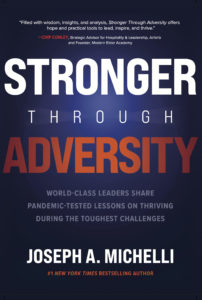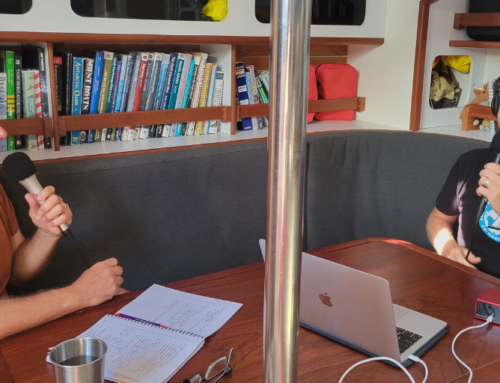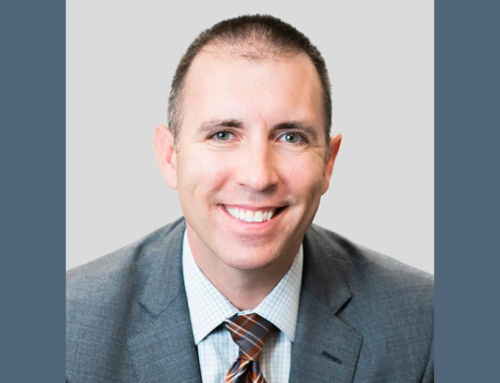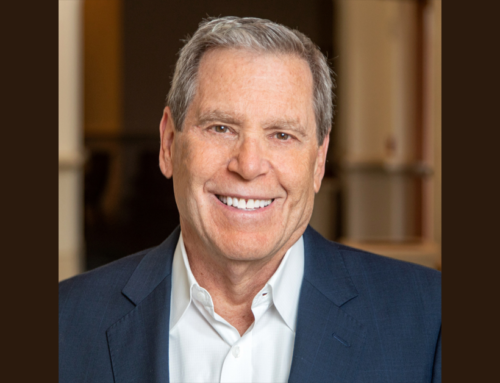This is a special guest post from Joseph Michelli, Ph.D.
Listen to my earlier podcast with him, 3 Customer Experience Triggers That Drive Growth, Loyalty, and Referrals, here.
Even for the best strategists, 2020 likely eviscerated your plans. As former heavyweight boxing champion, Mike Tyson once observed, “Everyone has a plan until they are punched in the mouth.” By the end of the first quarter of 2020, a submicroscopic organism 1/1000th the width of a human hair delivered a universal mouth punch. In keeping with Mike Tyson’s metaphor, COVID-19 knocked out some financial service professionals immediately. It made others wobble in the early rounds, while others are emerging well-positioned for success well beyond the pandemic. 
By late February 2020, I’d abandoned one of my plans (completing a book about a client of mine, GODIVA Chocolatier) and instead found myself on several COVID-19 taskforces. Those crisis teams gave me a front-row seat into how leaders across industries reacted to the worst crisis of our lifetime.
Over the ensuing months, I engaged in conversations with board members, founders, CEOs, presidents, C-suite leaders, and vice presidents of highly recognizable brands.
I captured the insights of more than 140 leaders in a McGraw-Hill book titled Stronger Through Adversity. Leaders represented for-profit and nonprofit organizations such as:
- Airbnb
- Feeding America
- Goodwill
- Kohl’s
- Marriott
- Mercedes-Benz
- Microsoft
- Salvation Army
- Southwest Airlines
- Starbucks
- Target
- United Way
- Verizon
In addition to the companies listed above, I reached out to clients and colleagues in the financial services industry. They shared their resilience lessons for thriving beyond the pandemic. Here are five actionable insights they offered in Stronger Through Adversity:
- Increase Communication Frequency While Not Sacrificing Clarity – Client and teams need regular communication, honest information, and a tone of realistic optimism during and beyond crisis. Penny Pennington, Managing Partner at Edward Jones, observed, “We’ve dialed up the frequency of communication and talked directly about the issues on the minds of the people we serve. We openly shared how we were making decisions and the reasons behind the hard choices we faced, like wage freezes or the cancellation of major events.”
Leaders like Penny cautioned that a failure to ramp up messaging could result in a vacuum that clients and team members would fill with misinformation, rumors, and worst-case scenarios. Conversely, these leaders warned that too much communication led to message fatigue, workflow disruptions, and decreased engagement when attention to a specific message was essential. They emphasized the importance of communicating based on a plan as opposed to an impulse.
- Use Crisis Energy to Drive Priorities – Joe Duran, Head of GS PFM for Goldman Sachs, explained, “If you are a strong company, a crisis can drive constructive change by accelerating movement into areas of opportunity. In a crisis, there is less resistance to innovation. As the pandemic unsettled everyone, you could help resettle them in a place of growth. I know that most people don’t share my view. However, being raised in a violent home in war-ravaged Zimbabwe, I’m very comfortable running into chaos and driving productivity by focusing on three C’s – communication, care, and clarity. Specific to clarity, your people need to know your priorities and how they can innovate to address them productively.”
See my earlier podcast with Joe Duran here.
To turn disruption into productive change, leaders need to channel the crisis’s emotional energy (fear, uncertainty, discomfort) toward critical objectives. In the absence of clear priorities, people expend energy aimlessly. By setting clear, prioritized targets, your clients and teams can plan and use their resources wisely.
- Craft Technology-Aided and Human-Powered Service Delivery – Ben Salzmann, President and CEO of Acuity Insurance, noted, “To streamline performance during a crisis – it helps to have invested in people and technology beforehand. Assuming you have selected talented people and provided them with cutting edge tools, it’s just a matter of modifying those tools in response to the crisis. In our case, we were able to adapt technologies so our employees could focus on our agents and customers without being disrupted. Instantly, 98% of our employees stopped working at headquarters and began working in their bedrooms, at client sites, or on the side of a highway. It happened flawlessly. They were handling large, complicated commercial and individual policies and executing smoothly. We’ve looked at our business, much like building an Olympic team. We had to select the best talent and provide them with world-class training and technology tools to focus on the goal of extraordinary care for one another, our agents, and our customers. That approach served us well before the pandemic and may have even served us better throughout it.”
Ben’s Olympic team analogy is especially illustrative. Designing streamlined productivity begins with talent selection. It then moves through enculturation, tactical prioritization, training, and tool enablement.
- Keep Your Eyes on the Horizon – Richard Weil, Janus Henderson Group CEO, emphasized the importance of adjusting your investment strategy in phases. Dick noted, “Most leaders try to plan for crises by creating a strong financial foundation and a robust culture. If that plan is successful, the first hit from the crisis should allow them to stay client-focused and not to be reactive in a self-focused way. Their people won’t need to be worried about themselves and instead can think about their clients first. That initial buffer provides an advantage to take a medium to a long-range perspective from the outset of the crisis. As the crisis holds on, however, it can be difficult to sustain perspective on the longer-term, especially as your reserves diminish.”
Despite the challenges of a prolonged crisis, Dick warned against cannibalizing future resources. He observed, “Even in those times, you can’t do destructive things like eat your seed corn or fire your best talent. To the highest degree possible, you have to firewall some of your resources to make sure you have the right people and tools needed to create success after you escape the crisis.”
- Define Your Leadership Legacy – You will be remembered more for what you do in a crisis than what you do in calm. Effective professionals identify how they want to be remembered once this crisis is over. They take action to increase the likelihood that their desired impact will occur. We will leave a legacy. The question is whether that legacy will be by design or default.
In keeping with prior writings on the importance of defining one’s legacy, I asked all 140 book participants how they wanted to be perceived, given their choices and behavior during the pandemic. Their responses fell into three broad areas. They either wanted to be known for leading with competence, purpose, or character.
Consistent with wanting to be known for character, Cathy Lanning, Senior Vice President, Property & Casualty Marketing at Nationwide Insurance, suggested she and her leadership team ideally would be seen as “bold and fearless. I come from a long history of leaders who didn’t fear tough decisions. They were visionaries about what protection means to people and businesses. Protection has heightened in its importance today. So, hopefully, people will see our leadership team as being willing to reinvent ourselves and do so fearlessly.” It’s noteworthy that Cathy frames her team’s legacy as a continuation of a legacy established by prior generations of leaders.
Joe Duran, CEO of Personal Financial Management at Goldman Sachs, described his desired legacy with a word not commonly used in investment and wealth management. Joe noted, “I hope people will say love was the driving force for everything we did. Ideally, they would feel we loved our people and our clients. They would also sense that we loved waking up each morning to serve them.”
What one impact do you wish to have long after the pandemic? What lessons have you affirmed or learned from the diverse challenges of 2020?
Author Napoleon Hill once observed, “Every adversity, every failure, every heartache carries with it the seed of an equal or greater benefit.” May those seeds position you and your organization to be Stronger Through Adversity.
Joseph Michelli, Ph.D., is a certified customer experience professional, one of Global Guru’s top three experts on customer service, the author of nine business books about companies like Airbnb, Starbucks, Zappos, Mercedes-Benz, and The Ritz-Carlton Hotel Company. In addition to being a Wall Street Journal and New York Times #1 bestselling author, Joseph helps leadership teams improve the experiences they provide for team members and customers. He also is an internationally sought-after keynote speaker on leadership and customer or patient experience. You can learn more about Stronger Through Adversity here.





